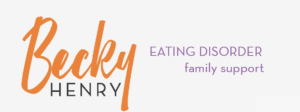 Parents and other family caregivers of those with eating disorders often want to give up and/or run away. Anxiety and fear are normal reactions to seeing your child/family member disappear before your eyes.
Parents and other family caregivers of those with eating disorders often want to give up and/or run away. Anxiety and fear are normal reactions to seeing your child/family member disappear before your eyes.
The demands on a family caregiver are so profound I often say it’s like the ‘Ironman of parenting’ only doing an ironman marathon every single day. Typically for more than a year. Every day. With no end in sight.
If you’ve parented a neuro-typical teenager you know how challenging that can be, now multiply those challenges by about 100.
Spouses and siblings have told me they feel like they can no longer do this job of supporting their wives/siblings with eating disorders. Spouses have told me about fearing for their children who are being told ed’s unreasonable rules about food that are so very dangerous to any child. They are being manipulated by ed and want to leave but know they cannot because then the children would be alone with their parent with ed who will impose food rules on the kids that could endanger them.
For years I’ve listened to family caregivers tell me that they cannot do it anymore. And together we find a way to get the caregivers oxygen mask firmly in place. Together we create loving boundaries to keep everyone safe and moving toward recovery. We get their needs on the priority list.
What’s missing is empathy, support and programming from the treatment team to help these family caregivers do the heavy lifting.
It must be so perplexing to clinicians to see this dynamic. For as clinicians you’ve been trained to separate yourself, keep healthy boundaries, know that these behaviors are very typical for someone with an eating disorder.
Family caregivers have typically not had that training and don’t know how to respond to the behaviors that show up when there are one or many co-occurring disorders and diagnoses along with the ed.
We are asking unsupported, terrified family caregivers to do these things and more (all with calm, compassion & confidence):
- Buy the food
- Prepare the food
- Serve the food
- Make sure 3 meals and 3 snacks are eaten each day
- Tolerate being treated disrespectfully with calm & compassion
- Support a loved one with any or all of these co-occurring diagnoses: depression, anxiety, OCD, bi-polar, etc
- Watch a loved with with severe anxiety try to do school and/or work
- Manage insurance denials
- Manage treatment teams and find new providers as treatment levels change
- Manage their own grief and loss as their loved one has disappeared
- Understand and learn about these complex & logic-less disorders
- Do their parallel process so they can manage their fears that are so valid
- Be a loving lighthouse without panicking about the slow motion train wreck they’re watching
- Cope with the isolation and stigma that come with mental illnesses
- Do all of the above and more with zero training or support
Of course family caregivers want to run away…why wouldn’t they?
Let’s do better. Let’s talk about how we can do better. Patients/clients lives and family member’s lives depend on it.


